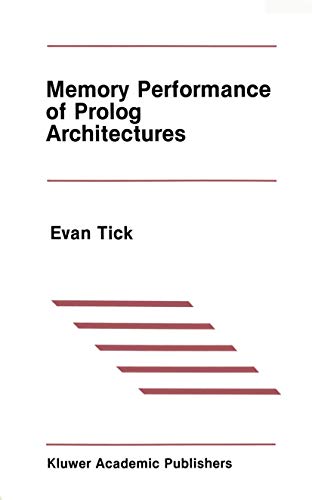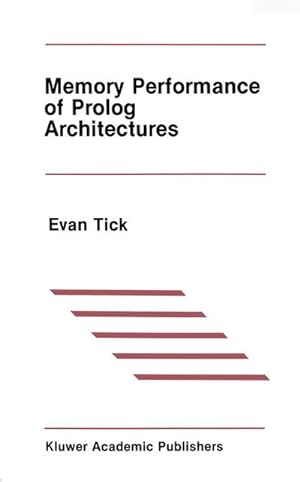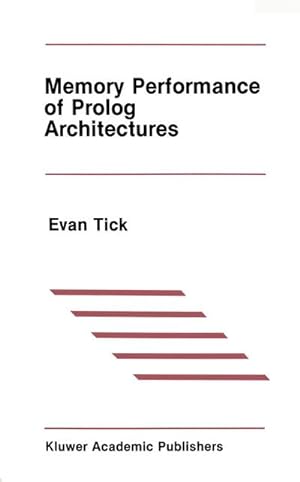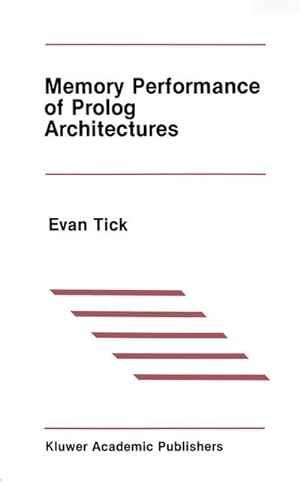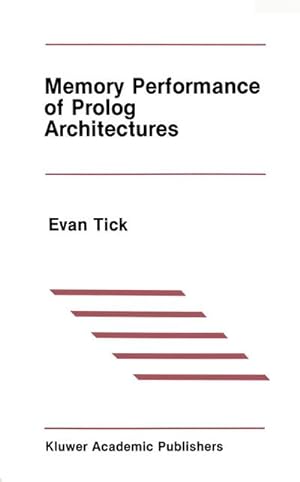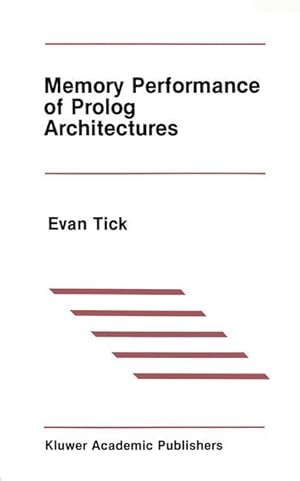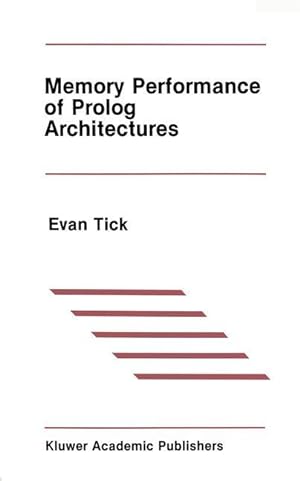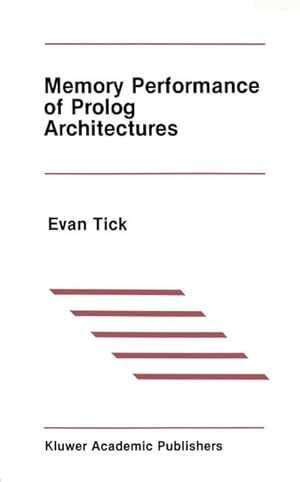memory performance prolog architectures von tick evan (17 Ergebnisse)
Suchfilter
Produktart
- Alle Product Types
- Bücher (17)
- Magazine & Zeitschriften (Keine weiteren Ergebnisse entsprechen dieser Verfeinerung)
- Comics (Keine weiteren Ergebnisse entsprechen dieser Verfeinerung)
- Noten (Keine weiteren Ergebnisse entsprechen dieser Verfeinerung)
- Kunst, Grafik & Poster (Keine weiteren Ergebnisse entsprechen dieser Verfeinerung)
- Fotografien (Keine weiteren Ergebnisse entsprechen dieser Verfeinerung)
- Karten (Keine weiteren Ergebnisse entsprechen dieser Verfeinerung)
- Manuskripte & Papierantiquitäten (Keine weiteren Ergebnisse entsprechen dieser Verfeinerung)
Zustand Mehr dazu
- Neu (15)
- Wie Neu, Sehr Gut oder Gut Bis Sehr Gut (2)
- Gut oder Befriedigend (Keine weiteren Ergebnisse entsprechen dieser Verfeinerung)
- Ausreichend oder Schlecht (Keine weiteren Ergebnisse entsprechen dieser Verfeinerung)
- Wie beschrieben (Keine weiteren Ergebnisse entsprechen dieser Verfeinerung)
Einband
Weitere Eigenschaften
- Erstausgabe (Keine weiteren Ergebnisse entsprechen dieser Verfeinerung)
- Signiert (Keine weiteren Ergebnisse entsprechen dieser Verfeinerung)
- Schutzumschlag (Keine weiteren Ergebnisse entsprechen dieser Verfeinerung)
- Angebotsfoto (10)
- Keine Print-on-Demand Angebote (9)
Sprache (1)
Gratisversand
- Kostenloser Versand nach USA (Keine weiteren Ergebnisse entsprechen dieser Verfeinerung)
Land des Verkäufers
Verkäuferbewertung
-
Memory Performance of Prolog Architectures
Sprache: Englisch
Verlag: Kluwer Academic Publishers, 1987
ISBN 10: 0898382548 ISBN 13: 9780898382549
Anbieter: Ammareal, Morangis, Frankreich
Hardcover. Zustand: Très bon. Ancien livre de bibliothèque. Salissures sur la tranche. Edition 1987. Ammareal reverse jusqu'à 15% du prix net de cet article à des organisations caritatives. ENGLISH DESCRIPTION Book Condition: Used, Very good. Former library book. Stains on the edge. Edition 1987. Ammareal gives back up to 15% of this item's net price to charity organizations.
-
Memory Performance of Prolog Architectures (The Springer International Series in Engineering and Computer Science)
Anbieter: Lucky's Textbooks, Dallas, TX, USA
EUR 156,61
EUR 3,40 shipping
Versand innerhalb von USAAnzahl: Mehr als 20 verfügbar
In den WarenkorbZustand: New.
-
Memory Performance of Prolog Architectures (The Springer International Series in Engineering and Computer Science, 40)
Anbieter: Lucky's Textbooks, Dallas, TX, USA
EUR 156,61
EUR 3,40 shipping
Versand innerhalb von USAAnzahl: Mehr als 20 verfügbar
In den WarenkorbZustand: New.
-
Zustand: New. pp. 256.
-
Taschenbuch. Zustand: Neu. Memory Performance of Prolog Architectures | Evan Tick | Taschenbuch | xxii | Englisch | 2011 | Springer US | EAN 9781461292029 | Verantwortliche Person für die EU: Springer Verlag GmbH, Tiergartenstr. 17, 69121 Heidelberg, juergen[dot]hartmann[at]springer[dot]com | Anbieter: preigu.
-
Memory Performance of Prolog Architectures
Sprache: Englisch
Verlag: Springer US, Springer US Dez 1987, 1987
ISBN 10: 0898382548 ISBN 13: 9780898382549
Anbieter: buchversandmimpf2000, Emtmannsberg, BAYE, Deutschland
Buch. Zustand: Neu. Neuware -One suspects that the people who use computers for their livelihood are growing more 'sophisticated' as the field of computer science evolves. This view might be defended by the expanding use of languages such as C and Lisp in contrast to the languages such as FORTRAN and COBOL. This hypothesis is false however - computer languages are not like natural languages where successive generations stick with the language of their ancestors. Computer programmers do not grow more sophisticated - programmers simply take the time to muddle through the increasingly complex language semantics in an attempt to write useful programs. Of course, these programmers are 'sophisticated' in the same sense as are hackers of MockLisp, PostScript, and Tex - highly specialized and tedious languages. It is quite frustrating how this myth of sophistication is propagated by some industries, universities, and government agencies. When I was an undergraduate at MIT, I distinctly remember the convoluted questions on exams concerning dynamic scoping in Lisp - the emphasis was placed solely on a 'hacker's' view of computation, i. e. , the control and manipulation of storage cells. No consideration was given to the logical structure of programs. Within the past five years, Ada and Common Lisp have become programming language standards, despite their complexity (note that dynamic scoping was dropped even from Common Lisp). Of course, most industries' selection of programming languages are primarily driven by the requirement for compatibility (with previous software) and performance.Springer Verlag GmbH, Tiergartenstr. 17, 69121 Heidelberg 258 pp. Englisch.
-
Memory Performance of Prolog Architectures
Sprache: Englisch
Verlag: Springer US, Springer New York, 2011
ISBN 10: 1461292026 ISBN 13: 9781461292029
Anbieter: AHA-BUCH GmbH, Einbeck, Deutschland
Taschenbuch. Zustand: Neu. Druck auf Anfrage Neuware - Printed after ordering - One suspects that the people who use computers for their livelihood are growing more 'sophisticated' as the field of computer science evolves. This view might be defended by the expanding use of languages such as C and Lisp in contrast to the languages such as FORTRAN and COBOL. This hypothesis is false however - computer languages are not like natural languages where successive generations stick with the language of their ancestors. Computer programmers do not grow more sophisticated - programmers simply take the time to muddle through the increasingly complex language semantics in an attempt to write useful programs. Of course, these programmers are 'sophisticated' in the same sense as are hackers of MockLisp, PostScript, and Tex - highly specialized and tedious languages. It is quite frustrating how this myth of sophistication is propagated by some industries, universities, and government agencies. When I was an undergraduate at MIT, I distinctly remember the convoluted questions on exams concerning dynamic scoping in Lisp - the emphasis was placed solely on a 'hacker's' view of computation, i. e. , the control and manipulation of storage cells. No consideration was given to the logical structure of programs. Within the past five years, Ada and Common Lisp have become programming language standards, despite their complexity (note that dynamic scoping was dropped even from Common Lisp). Of course, most industries' selection of programming languages are primarily driven by the requirement for compatibility (with previous software) and performance.
-
Buch. Zustand: Neu. Druck auf Anfrage Neuware - Printed after ordering - One suspects that the people who use computers for their livelihood are growing more 'sophisticated' as the field of computer science evolves. This view might be defended by the expanding use of languages such as C and Lisp in contrast to the languages such as FORTRAN and COBOL. This hypothesis is false however - computer languages are not like natural languages where successive generations stick with the language of their ancestors. Computer programmers do not grow more sophisticated - programmers simply take the time to muddle through the increasingly complex language semantics in an attempt to write useful programs. Of course, these programmers are 'sophisticated' in the same sense as are hackers of MockLisp, PostScript, and Tex - highly specialized and tedious languages. It is quite frustrating how this myth of sophistication is propagated by some industries, universities, and government agencies. When I was an undergraduate at MIT, I distinctly remember the convoluted questions on exams concerning dynamic scoping in Lisp - the emphasis was placed solely on a 'hacker's' view of computation, i. e. , the control and manipulation of storage cells. No consideration was given to the logical structure of programs. Within the past five years, Ada and Common Lisp have become programming language standards, despite their complexity (note that dynamic scoping was dropped even from Common Lisp). Of course, most industries' selection of programming languages are primarily driven by the requirement for compatibility (with previous software) and performance.
-
Memory Performance of Prolog Architectures (The Springer International Series in Engineering and Computer Science)
Anbieter: Mispah books, Redhill, SURRE, Vereinigtes Königreich
EUR 224,41
EUR 28,52 shipping
Versand von Vereinigtes Königreich nach USAAnzahl: 1 verfügbar
In den WarenkorbPaperback. Zustand: Like New. Like New. book.
-
Memory Performance of Prolog Architectures
Anbieter: BuchWeltWeit Ludwig Meier e.K., Bergisch Gladbach, Deutschland
Buch. Zustand: Neu. This item is printed on demand - it takes 3-4 days longer - Neuware -One suspects that the people who use computers for their livelihood are growing more 'sophisticated' as the field of computer science evolves. This view might be defended by the expanding use of languages such as C and Lisp in contrast to the languages such as FORTRAN and COBOL. This hypothesis is false however - computer languages are not like natural languages where successive generations stick with the language of their ancestors. Computer programmers do not grow more sophisticated - programmers simply take the time to muddle through the increasingly complex language semantics in an attempt to write useful programs. Of course, these programmers are 'sophisticated' in the same sense as are hackers of MockLisp, PostScript, and Tex - highly specialized and tedious languages. It is quite frustrating how this myth of sophistication is propagated by some industries, universities, and government agencies. When I was an undergraduate at MIT, I distinctly remember the convoluted questions on exams concerning dynamic scoping in Lisp - the emphasis was placed solely on a 'hacker's' view of computation, i. e. , the control and manipulation of storage cells. No consideration was given to the logical structure of programs. Within the past five years, Ada and Common Lisp have become programming language standards, despite their complexity (note that dynamic scoping was dropped even from Common Lisp). Of course, most industries' selection of programming languages are primarily driven by the requirement for compatibility (with previous software) and performance. 258 pp. Englisch.
-
Memory Performance of Prolog Architectures
Sprache: Englisch
Verlag: Springer US, Springer New York Nov 2011, 2011
ISBN 10: 1461292026 ISBN 13: 9781461292029
Anbieter: BuchWeltWeit Ludwig Meier e.K., Bergisch Gladbach, Deutschland
Taschenbuch. Zustand: Neu. This item is printed on demand - it takes 3-4 days longer - Neuware -One suspects that the people who use computers for their livelihood are growing more 'sophisticated' as the field of computer science evolves. This view might be defended by the expanding use of languages such as C and Lisp in contrast to the languages such as FORTRAN and COBOL. This hypothesis is false however - computer languages are not like natural languages where successive generations stick with the language of their ancestors. Computer programmers do not grow more sophisticated - programmers simply take the time to muddle through the increasingly complex language semantics in an attempt to write useful programs. Of course, these programmers are 'sophisticated' in the same sense as are hackers of MockLisp, PostScript, and Tex - highly specialized and tedious languages. It is quite frustrating how this myth of sophistication is propagated by some industries, universities, and government agencies. When I was an undergraduate at MIT, I distinctly remember the convoluted questions on exams concerning dynamic scoping in Lisp - the emphasis was placed solely on a 'hacker's' view of computation, i. e. , the control and manipulation of storage cells. No consideration was given to the logical structure of programs. Within the past five years, Ada and Common Lisp have become programming language standards, despite their complexity (note that dynamic scoping was dropped even from Common Lisp). Of course, most industries' selection of programming languages are primarily driven by the requirement for compatibility (with previous software) and performance. 256 pp. Englisch.
-
Memory Performance of Prolog Architectures
Anbieter: moluna, Greven, Deutschland
EUR 136,16
EUR 48,99 shipping
Versand von Deutschland nach USAAnzahl: Mehr als 20 verfügbar
In den WarenkorbZustand: New. Dieser Artikel ist ein Print on Demand Artikel und wird nach Ihrer Bestellung fuer Sie gedruckt. One suspects that the people who use computers for their livelihood are growing more sophisticated as the field of computer science evolves. This view might be defended by the expanding use of languages such as C and Lisp in contrast to the languages such.
-
Memory Performance of Prolog Architectures
Anbieter: moluna, Greven, Deutschland
EUR 136,16
EUR 48,99 shipping
Versand von Deutschland nach USAAnzahl: Mehr als 20 verfügbar
In den WarenkorbGebunden. Zustand: New. Dieser Artikel ist ein Print on Demand Artikel und wird nach Ihrer Bestellung fuer Sie gedruckt. One suspects that the people who use computers for their livelihood are growing more sophisticated as the field of computer science evolves. This view might be defended by the expanding use of languages such as C and Lisp in contrast to the languages such.
-
Memory Performance of Prolog Architectures
Anbieter: preigu, Osnabrück, Deutschland
Buch. Zustand: Neu. Memory Performance of Prolog Architectures | Evan Tick | Buch | xxii | Englisch | 1987 | Springer US | EAN 9780898382549 | Verantwortliche Person für die EU: Springer Verlag GmbH, Tiergartenstr. 17, 69121 Heidelberg, juergen[dot]hartmann[at]springer[dot]com | Anbieter: preigu Print on Demand.
-
Memory Performance of Prolog Architectures
Anbieter: Majestic Books, Hounslow, Vereinigtes Königreich
EUR 213,11
EUR 7,41 shipping
Versand von Vereinigtes Königreich nach USAAnzahl: 4 verfügbar
In den WarenkorbZustand: New. Print on Demand pp. 256 49:B&W 6.14 x 9.21 in or 234 x 156 mm (Royal 8vo) Perfect Bound on White w/Gloss Lam.
-
Memory Performance of Prolog Architectures
Sprache: Englisch
Verlag: Springer US, Springer New York Nov 2011, 2011
ISBN 10: 1461292026 ISBN 13: 9781461292029
Anbieter: buchversandmimpf2000, Emtmannsberg, BAYE, Deutschland
Taschenbuch. Zustand: Neu. This item is printed on demand - Print on Demand Titel. Neuware -One suspects that the people who use computers for their livelihood are growing more 'sophisticated' as the field of computer science evolves. This view might be defended by the expanding use of languages such as C and Lisp in contrast to the languages such as FORTRAN and COBOL. This hypothesis is false however - computer languages are not like natural languages where successive generations stick with the language of their ancestors. Computer programmers do not grow more sophisticated - programmers simply take the time to muddle through the increasingly complex language semantics in an attempt to write useful programs. Of course, these programmers are 'sophisticated' in the same sense as are hackers of MockLisp, PostScript, and Tex - highly specialized and tedious languages. It is quite frustrating how this myth of sophistication is propagated by some industries, universities, and government agencies. When I was an undergraduate at MIT, I distinctly remember the convoluted questions on exams concerning dynamic scoping in Lisp - the emphasis was placed solely on a 'hacker's' view of computation, i. e. , the control and manipulation of storage cells. No consideration was given to the logical structure of programs. Within the past five years, Ada and Common Lisp have become programming language standards, despite their complexity (note that dynamic scoping was dropped even from Common Lisp). Of course, most industries' selection of programming languages are primarily driven by the requirement for compatibility (with previous software) and performance.Springer Verlag GmbH, Tiergartenstr. 17, 69121 Heidelberg 256 pp. Englisch.
-
Memory Performance of Prolog Architectures
Anbieter: Biblios, Frankfurt am main, HESSE, Deutschland
Zustand: New. PRINT ON DEMAND pp. 256.


